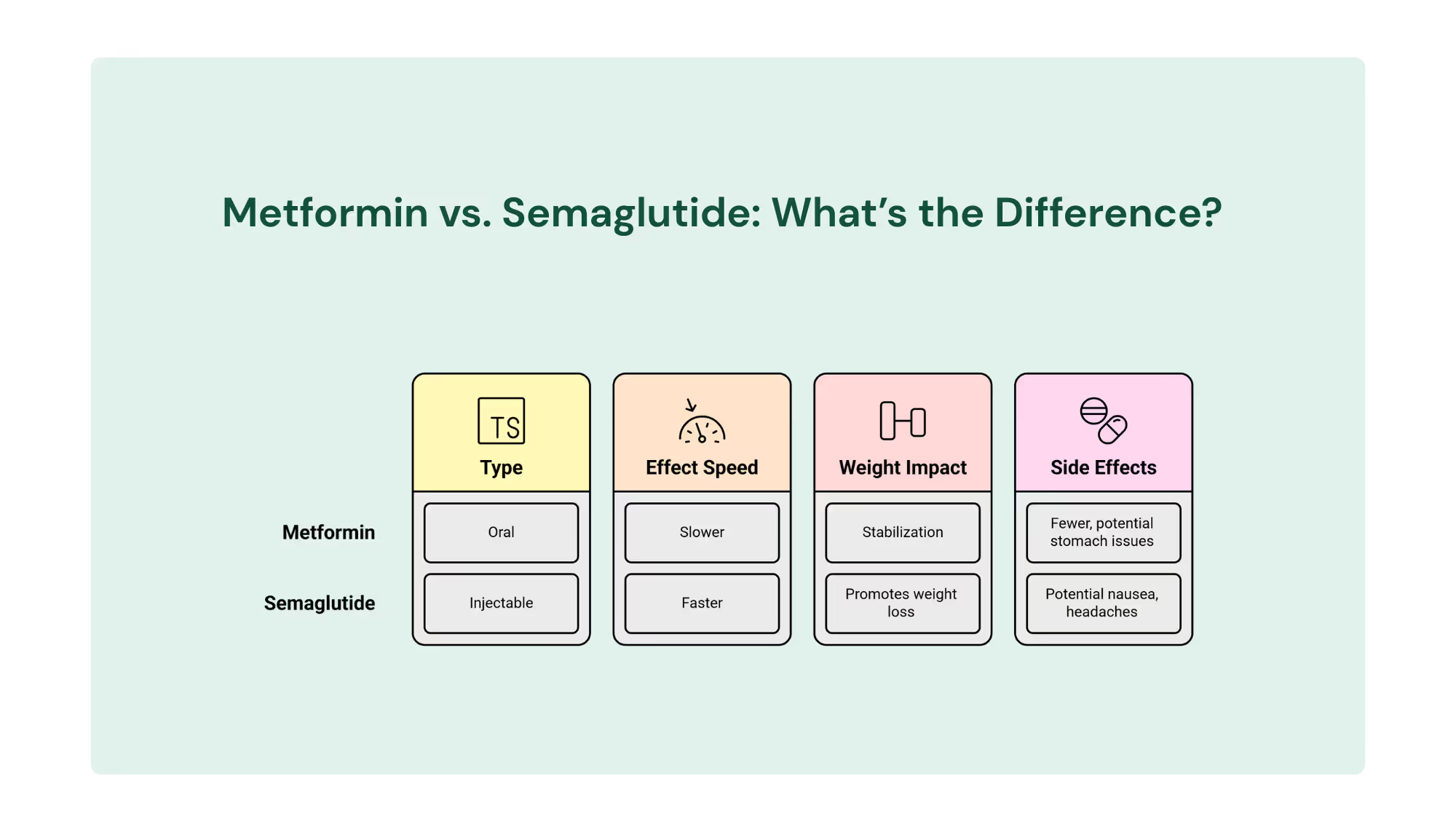Article Outline
Explore Weight Loss Treatments


Semaglutide vs. Metformin: Which Is Better for Weight Loss in 2026?
Are you struggling to make the tough choice between metformin vs semaglutide for weight loss?
You're not alone. The choice between semaglutide vs. metformin depends on your budget, health goals, medical history, and potential side effect considerations.
This guide will help break down how each medication works, compare their effectiveness, side effects, and costs, and help you decide which option fits your long-term weight management plan best.
Semaglutide And Metformin For Weight Loss
Both medications support weight loss, but through different pathways and with varying degrees of effectiveness.
Semaglutide (Wegovy, Ozempic)
Semaglutide is a GLP-1 receptor agonist that mimics a natural hormone in your body. It works by decreasing blood sugar levels, enhancing insulin production, inhibiting glucagon, and reducing food intake by lowering appetite and slowing digestion.
Originally, semaglutide was approved for type 2 diabetes, but it eventually gained FDA approval for chronic weight management in 2021 under the brand name Wegovy.
With Ivy Rx, you can access personalized GLP-1 injections with medical supervision, guided dosing, and convenient home delivery.
Want to know how fast semaglutide works for weight loss? Most patients see initial results within 4-8 weeks, but individual results may vary depending on many factors which you can learn about in our guide.
Metformin
Metformin is a biguanide medication that primarily works by decreasing glucose production in the liver and improving insulin sensitivity.
While not explicitly FDA-approved for weight loss, metformin produces modest weight reduction as a beneficial side effect.
Differences Between How Semaglutide and Metformin Work

Semaglutide and metformin both support weight loss and metabolic health, but they work in entirely different ways.
Semaglutide helps you lose weight by reducing appetite and slowing digestion, which makes you feel full longer and naturally eat less.
Metformin, on the other hand, improves how your body uses insulin and reduces glucose production in the liver. Still, it doesn’t suppress appetite, so results depend more on your diet and lifestyle.
Here’s a closer look at how the two compare:
Learn more about what semaglutide does to your body.
Effectiveness of Semaglutide vs. Metformin for Weight Loss
When it comes to weight loss, clinical research shows a clear difference in how much each medication can help you lose and how fast.
- Semaglutide: In major clinical trials like the STEP 1 study, participants lost an average of 10–15% of their body weight over 68 weeks, with some achieving up to 20% loss at higher doses. Results are typically noticeable within the first 8–12 weeks.
- Metformin: Studies, including the Diabetes Prevention Program, show an average 2–5% weight loss over 6–12 months, with about one in four patients losing 5% or more of their starting weight.
In short, semaglutide produces greater and faster results, while metformin supports modest, steady weight loss over time.
If you’re not seeing the results you expected with semaglutide, pairing it with a structured semaglutide-friendly diet plan can help you achieve better and more consistent weight loss.
Dosage Comparison For Weight Loss Between Semaglutide and Metformin
Here’s a table that covers the dosage comparison between semaglutide vs metformin:
Both medications require gradual dose increases to reduce possible side effects and improve tolerability.
Important Note: These dosages are for reference only. Always consult your healthcare provider before starting either medication to determine the correct dose for your individual health profile, medical history, and weight loss goals.
Can You Take Semaglutide and Metformin Together?
Yes, it's safe and often more effective. Taking both medications together works better for people with type 2 diabetes and obesity.
Here's why the combination works:
- Metformin improves how your body uses insulin.
- Semaglutide reduces your appetite and helps control blood sugar.
Hence, taking semaglutide and metformin works better; they attack weight loss and blood sugar from two different angles.
But talk to your doctor to see if combining these medications fits your treatment plan and is safe for you.
Common Side Effects: Semaglutide vs. Metformin
Both medications primarily cause gastrointestinal side effects, but with different patterns.
Semaglutide
Common side effects:
- Nausea
- Vomiting
- Diarrhea
- Abdominal pain
- Decreased appetite
- Fatigue
- Headache
These effects may stem from delayed gastric emptying or activation of brain centers involved in appetite regulation.
Learn ways to manage semaglutide side effects and see before and after 1-month results.
Metformin
The most common metformin side effects can often be avoided by gradual dose escalation.
Common side effects:
- Diarrhea.
- Nausea.
- Bloating.
- Abdominal discomfort.
- Vitamin B12 deficiency (long-term use).
Read more about metformin side effects in detail.
Warnings and Precautions Before Taking These Medications
Both medications have important safety considerations that require medical supervision.
Semaglutide
Do not use semaglutide if you have:
- Personal or family history of medullary thyroid carcinoma (MTC).
- Multiple Endocrine Neoplasia syndrome type 2 (MEN 2).
- Severe gastroparesis.
- History of pancreatitis.
- Pregnancy or planning pregnancy (discontinue 2 months before conception).
Additional precautions include monitoring for diabetic retinopathy complications, gallbladder disease risk, and potential kidney injury.
Metformin
Do not use metformin if you have:
- Severe kidney disease (eGFR <30 mL/min/1.73 m²).
- Acute or chronic metabolic acidosis.
- Severe liver disease.
- Acute heart failure.
- Recent heart attack or stroke.
- Severe infection or dehydration.
- Scheduled surgery requiring anesthesia.
Pro Tip: If you take metformin for a long time, make sure your doctor checks your vitamin B12 levels regularly. This is because metformin can sometimes lower vitamin B12 in the body, which may lead to a deficiency over time.
Cost & Insurance Coverage Semaglutide And Metformin
Cost differences between these medications are substantial and can significantly impact treatment accessibility.
Check out Hers semaglutide reviews from their real customers and learn how to get semaglutide at more affordable prices.
Semaglutide vs. Metformin: Which One to Choose to Lose Weight?
Choose Semaglutide if you:
- Need substantial weight loss (10-20% of body weight).
- Have obesity (BMI ≥30) or overweight (BMI ≥27) with complications.
- Have type 2 diabetes requiring improved glycemic control.
- Have cardiovascular disease and qualify for cardioprotective benefits.
- Can afford $499-$1,350/month or have insurance coverage.
- Are comfortable with weekly injections or daily oral tablets (Rybelsus).
- Want stronger appetite suppression.
Choose Metformin if you:
- Have modest weight loss goals (2-10 pounds).
- Have type 2 diabetes, prediabetes, or insulin resistance.
- Have polycystic ovary syndrome (PCOS).
- Need affordable medication ($2-$30/month).
- Want oral medication only.
- Have budget constraints or limited insurance coverage.
Can I Switch Between Semaglutide and Metformin?
Yes, you may be able to safely switch between semaglutide and metformin under medical supervision. If metformin isn’t producing enough weight loss or blood sugar control, your doctor may recommend adding or switching to semaglutide.
But if semaglutide causes side effects or becomes too expensive, moving back to metformin is a reasonable option, though results may be more modest.
During the switch, your provider will start you on a low semaglutide dose and monitor your progress to ensure a smooth, safe transition.
How to Get Semaglutide or Metformin?
Several safe and convenient options exist for accessing these medications with proper medical supervision.
Access options include:
- Telehealth providers – Connect with licensed clinicians online for evaluation and prescriptions, offering convenience and often competitive pricing.
- Primary care physicians or endocrinologists – For in-person consultations, comprehensive diabetes management, and coordinated care with other specialists.
- Pharmacies and mail-order programs – For ongoing refills, medication support, and potentially lower costs through 90-day supplies.
Access Ivy Rx’s expert-guided GLP-1 treatment that offers reliable weight loss benefits. It comes with free consultations, fast approvals, and ongoing medical support.
Learn how to effectively hit your weight loss goals with a simple semaglutide online program.
Still Not Sure? Start with a Free Weight Loss Assessment to Access the Most Suitable Treatment
Ivy Rx offers free consultations with licensed healthcare providers who evaluate your medical history, weight loss goals, budget, and health conditions to recommend the most appropriate treatment for your unique situation.
Whether you need the powerful weight loss effects of semaglutide or the affordable, proven benefits of metformin, or both together, Ivy Rx provides personalized care, ongoing support, and convenient home delivery.
Take the first step toward your weight loss goals today. Start your free consultation with Ivy Rx and discover which medication will help you achieve lasting results safely and effectively.
FAQs
Is Metformin approved for weight loss by the FDA?
No, metformin is not FDA-approved specifically for weight loss. It's approved only for type 2 diabetes treatment. However, doctors may prescribe it off-label for weight management when appropriate.
Does Semaglutide suppress appetite more than Metformin?
Yes, semaglutide significantly suppresses appetite as a primary mechanism of action, while metformin doesn't directly affect appetite.
Can I take Semaglutide or Metformin without having diabetes?
Semaglutide can be prescribed for weight loss without diabetes (as Wegovy). Metformin is sometimes prescribed off-label for prediabetes, insulin resistance, or PCOS, but requires medical evaluation and monitoring.

Ivy RX patients
Members of Ivy RX branded medications were paid for their testimonials.
- https://www.fda.gov/news-events/press-announcements/fda-approves-first-treatment-reduce-risk-serious-heart-problems-specifically-adults-obesity-or. Accessed 20th October, 2025.
- John W. Apolzan, Elizabeth M. Venditti, Sharon L. Edelstein, et al; for the Diabetes Prevention Program Research Group. Ann Intern Med.2019;170:682-690. [Epub 23 April 2019]. https://www.acpjournals.org/doi/10.7326/M18-1605. doi:10.7326/M18-1605.
- Wilding JPH, Batterham RL, Calanna S, et al. Once-weekly semaglutide in adults with overweight or obesity. New England Journal of Medicine. 2021;384(11):989–1002. doi:10.1056/NEJMoa2032183
- Li J, Li K, Liu Z, Yu H, Zhang J. Efficacy and safety of semaglutide combined with metformin in treating T2DM with overweight or obesity: a systematic review and meta-analysis. Am J Transl Res. 2024 Aug 15;16(8):3545-3556. https://pmc.ncbi.nlm.nih.gov/articles/PMC11384358/. doi: 10.62347/RYLN5360.
- Kommu S, Whitfield P. Semaglutide. [Updated 2024 Feb 11]. In: StatPearls [Internet]. Treasure Island (FL): StatPearls Publishing; 2025 Jan-. Available from: https://www.ncbi.nlm.nih.gov/books/NBK603723/.
Related
Resources

Semaglutide for PCOS: Benefits, Risks and Treatment Comparison (in 2026)
The benefits of Semaglutide for PCOS and its possible side effects. Find out how this medication works and what you need to know about the risks.

Bariatric Surgery vs Ozempic: Results, Cost & Risks Compared
Compare bariatric surgery vs Ozempic for weight loss: effectiveness, cost, risks, timelines, and who each option is best for.

How Fast Is Weight Loss With Farxiga? Timeline & Expectation
Learn how quickly weight loss happens with Farxiga, what clinical trials show, typical results, and how it compares to other medical weight-loss options.

















.avif)






.png)


